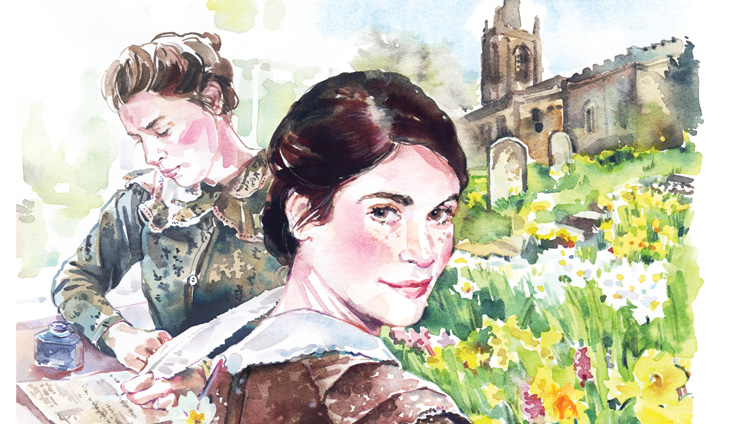Home’s Best
Why was Mother so keen to have Sibyl and me back for the day?

Illustration: Tracy Fennell
Subscribe to The People’s Friend! Click here
Why was Mother so keen to have Sibyl and me back for the day?

Illustration: Tracy Fennell
HISTORICAL SHORT STORY BY ALISON CARTER
In this story, set in 1838, Why was Mother so keen to have Sibyl and me back for the day?
There was our mother, and then there was Effie’s mother. Though we should not even have thought the thought, we did sometimes wish we had been born to Mrs Barber instead of Mrs Walsh.
Mrs Barber and Effie were close. They looked alike and dressed alike, with considerably more finery than our mother ever would have permitted.
Neither family could afford much in the way of ribbons and lace, but Mariah Barber spent every spare penny she had on Effie, while Sibyl and I wore our brown dresses with plain linen collars and not so much as a bit of trimming.
Mothering Sunday was one such occasion.
It was one of the few times when all three of us – Effie Barber, Sibyl and me – were allowed to go home and spend the day with our parents.
Sibyl and I would go to Sutton Common (our village), and Effie to Send, another half-hour’s walk away from Guildford.
We were all in service with nice families in Guildford in large houses.
We could all meet in town on our half-days off, and Effie would say how much she longed to be at home every time.
“How many days off until Mothering Sunday?” she asked us one late January afternoon.
We were in North Street in Guildford with our noses pressed against the glass of a shop.
The new Queen, Victoria, had come to the throne the summer before, and all the fashions were following her. We wanted to take a look.
“Six,” Sibyl replied.
“I will collect a big bouquet of flowers from the hedgerows on my way home on Mothering Sunday morning,” Effie declared.
My mother will see me coming just by the colour of them.
“I do hope the weather’s fine, because we will have a picnic, or even a trip, and she’s bound to invite some young men along.”
Sibyl and I looked at each other. Our mother never even mentioned young men.
“Will you collect flowers for your mother?” Effie asked.
“We will,” I confirmed.
We always did so, because Effie did, but Mother was never effusive in her thanks.
She would nod and press her nose to them, then find a pot to put them in and quickly move on to discussions of how little time there was before church.
Our father was the grave digger at St Philip and St Paul’s, the parish church, and both our parents were devoted churchgoers.
It took up a great deal of their lives – occasionally too much, their daughters felt, although we rarely dared say so.
“Oh, look at that lawn cotton in the corner!” Effie exclaimed. “That’s lovely.”
“Can you imagine Mother buying that?” I said, and Sibyl laughed.
Effie turned to us.
“Why don’t you come to our house this Mothering Sunday? You’d like a picnic, wouldn’t you?”
“We couldn’t,” I replied, thinking of the two church services our mother liked us to attend.
“You could pay your respects at Sutton,” Effie suggested, “then walk on to our village for the rest of the day.
“It would be fun.” She hesitated. “I know it can be . . . sombre at Digger’s Cottage.”
We really didn’t like the name of our little house, but it came with my father’s job so we had to live with it.
The idea of visiting the Barbers grew on us as the weeks passed, until Sibyl (the older daughter) wrote to our mother and carefully suggested it.
You are so busy all that day with your duties at St Philip and St Paul’s, she wrote. We are only mouths to feed, in the end.
Mother arranged the flowers and cleaned the church, and Father was a part-time church warden with a lot to do.
We knew very well that our mother did not approve of the Barbers.
The year before, on Mothering Sunday, while we were at home in the cottage, I had turned to Mother.
“Mrs Barber and Effie will be taking a tour of Guildford Castle today. I think they have hired a trap for the occasion.”
Mother continued to scrub at my father’s boots, ready for Holy Communion, taking off the graveyard dirt.
“I hope they enjoy their tour,” she said.
She was without frivolity, a stern person and godly above all. We loved her, and we knew she was fond of us, but we didn’t see signs of it very often.
We both missed home when we were away at our work – girls of fourteen or fifteen are bound to – but we were envious of the wild affection that Mrs Barber showed, and the gifts she gave Effie.
Mother always prepared good food for us when we came back, but nobody played cards afterwards or drank a glass of wine, as they did at the Barbers’ house.
Mother had told us the year before that Mothering Sunday was also called Refreshment Sunday.
We were not very interested in ecclesiastical history, but she told us anyway. It was better than her reading a sermon.
“Lent’s fasting rules are less strict on this particular Sunday,” she told us.
“You will have heard that the New Testament reading today was the story of Jesus feeding five thousand people with only five barley loaves and two fish.
“On this Sunday the church considers food.”
We listened politely, but I knew Sibyl itched to say that it was 1838, and old customs like that were falling away. But we knew better than to answer back.
Let me reassure you that Mother was not a cold person; it was just that she was . . . not warm.
We had seen Mrs Barber clasp her daughter to her breast and weep with affection, doting on Effie. Sibyl and I got none of this.
Mother suspected that we didn’t go to church in Guildford, and she was right.
It wasn’t hard for us to avoid it: the families we worked for did not watch our movements except when we were at their beck and call.
So when Effie had suggested we visit their house, we knew Mother would want us in the cottage instead, making sure we got our fill of bidding prayers and the Creed.
But Effie’s offer was so tempting, and so we sent our letter.
A letter came back addressed to Sibyl, but meant for us both.
We had hardly ever seen our mother’s handwriting – she did not write to us, and saved her conversation when we were at home for church matters, how we must visit the sick and give alms.
“Can’t you hear her voice in every word?” Sibyl asked.
We were sitting on a stone railing at the bottom of Guildford High Street’s steep slope down the River Wey.
Can’t you see her, furiously scratching at the paper with her pen?
It was a long letter. It began with greetings and news of home: a wall had fallen down in the churchyard by the yew tree and Father was expected to make repairs. One of the chickens had died.
“Oh, now there’s more history,” Sibyl said, holding the letter in front of me.
I saw all the lines of words and could not help think that reading it all would use up my half-day.
But we had to.
“History?” I repeated.
Sibyl began to read.
“I do not think I have ever related to you, my girls, the rest of the story of Mothering Sunday.
“On most Sundays, English churchgoers worship at their nearest parish church, wherever they happen to be.
“For you children that is Holy Trinity, of course – a handsome Guildford church.”
Sibyl sniffed.
“We are being told to be better Christians with better habits. She names the Guildford church to remind us to go.”
“But she does call us ‘my girls’,” I pointed out, tapping the page. “That’s kind.”
“Let me read it,” Sibyl said, and she began again.
“We call that church – the one that a person lives nearby – a person’s ‘daughter church’.”
“Oh,” I said. “I didn’t know that.”
“Neither did I. It’s funny,” Sibyl said, “because Holy Trinity is a great big church, and St Phil and St Paul’s is very small.”
“Don’t let Mother hear you calling it ‘St Phil’,” I told her with a laugh.
“Listen.” Sibyl began again.
“The church of one’s birth, and where one’s family lives, that is called a person’s mother church.
“For years – centuries – people away from home have returned on this special Sunday in the middle of Lent, from daughter church to mother church.
“It has been important for every person away from home, and every person waiting for them at home.”
“I thought we called it Mothering Sunday because we all go home to our mothers!” I cried.
Sibyl slapped my arm.
“Will you listen?” she snapped.
“Sibyl, Agnes, you are young, and I can picture you reading my letter. Do you meet, the two of you? Do you walk together?”
Her questions surprised me; it was as though she was picturing us in her mind.
Sibyl read on.
The tradition had changed, Mother admitted.
Visiting the mother church had slowly changed into a day of family reunion, when children had begun to work away from home.
“In my youth, children stayed where they were and worked the land,” Mother wrote.
“She was not happy in her childhood,” I said softly to Sibyl as we looked at the letter.
One memorable day when Mother was irritable with us, Father had told us that her own parents had been harsh and violent.
She had been glad to marry and get away.
“Yes,” Sibyl agreed.
She paused for a while and then she read on, about how nowadays domestic servants and apprentices are given the day as a holiday, but most of them do not know the origin of the day or the meaning of its name.
“Here we are again,” I grumbled. “Sibyl and Agnes must improve. Here’s the thrust of it.”
“She says we must come home for that reason . . .
Things about tradition being a backbone and church tradition the strongest of all the backbones.
“A lot about backbones,” I remarked.
Sibyl laid the pages on her lap.
“It sounds as though she is pleading,” she said.
“Well, she isn’t here with us, so I suppose she feels she has to plead. It offends her that we might go to Effie’s.”
“Effie’s,” Sibyl murmured wistfully. “She told me that they have a draughts set and there are competitions with her brothers.”
“Cake for tea.”
“Mrs Barber embracing everyone.”
Then Effie suggested we come to the Barber house on the Saturday evening.
There was time to complete the walk from Guildford to Send before it was too dark.
“And what a wonderful time we will have!” Effie exclaimed.
“My mother asks you – no, she insists – that you come. She says she adores both of you.”
I was sure that neither Sibyl nor I had ever been adored before, and it felt nice.
I thought of Mrs Barber and her pink cheeks and pretty smile, and I was tempted.
Effie had more to say.
“She remembers every detail of you two as little girls, she says, when we used to attend St Phil’s.
“She wants to mother you, that’s the truth of it – right through Mothering Sunday!”
It’s wicked to say it, but Sibyl and I were finally swayed by the promise of gifts.
Effie assured us that, while she gathered nosegays for her dear mother, her mother bought trinkets in exchange.
“Plenty for all her girls!” Effie declared.
When there were 10 days to go before the holiday, we had another letter.
Our mother had heard about the proposed visit to Effie’s via the churches of that part of Surrey.
She knew every churchgoer in the county, as far as we could tell, and through that grapevine, she knew that her children were thinking of delaying their visit to Digger’s Cottage.
I learned that you may call in on your way back to work from Send and Mr and Mrs Barber’s, she wrote.
Her handwriting wasn’t as good as in the first letter, and Sibyl and I passed it between us to make out all the words.
I will only say this once more, she wrote. I would very much like you to be at home that Sunday.
She repeated all the things about returning to the mother church, and how that had been forgotten.
She said that all anyone could think of was maidservants and grooms spending time in the bosoms of the families, but that in its origin it was all about worship and duty.
“I love our mother,” I said with a small sigh.
“Oh, she’s . . . well, she’s Mother,” Sibyl said. “But I wish she were more like Mrs Barber.”
We took the plunge and wrote a few lines to say we looked forward to seeing her before we walked back to work, and to send our best love to Father.
“Mention that Mrs Barber longs for us to visit,” I urged, standing over Sibyl as she wrote.
“Do you think so?” Sibyl asked. “It seems pointed.”
“I don’t think it would be so bad to let her know how other mothers are,” I stated.
We arrived at the Barbers’ on Saturday night to find their little house full of people, and Mrs Barber holding court.
Effie was flirting with a young man and didn’t see us enter, so it was awkward.
But then she dashed at us and pulled us about the room by our hands, telling people we were her “little friends from Guildford”.
“And pretty as pictures, don’t you think?” she asked an older woman, making us both blush.
Effie left us alone again after that, and soon we were standing like two nine-pins by a wall, wondering what to do next.
I suggested to Sibyl that we could look for tea, or anything to eat, and we made our way along a passage out of the parlour.
We stopped and waited out of sight when we saw Mrs Barber in her kitchen.
She was with the older woman to whom we’d been introduced.
“Who are the two thin girls?” the woman asked, taking a steaming cup of punch.
“Who?” Mrs Barber asked.
“The two girls with brown hair, very alike, standing like statues.”
“Friends of Effie’s. I can’t recall their names.” She bent closer to the woman.
“Their father digs graves, I think, at Sutton Common. Not a pleasant trade.”
“Goodness no, but I suppose somebody has to do it.”
“They made my skin prickle a little when I saw them and remembered that about the father.” Mrs Barber looked up at the ceiling.
“Alice, possibly, and Sylvie – something like that.
“I said Effie could have them here – we have too many men in the party so the numbers needed making up.”
I did not need to say a word to Sibyl: we knew each other’s thoughts.
Mrs Barber was not our mother for a weekend. She was not our mother in any shape or form.
She cared not a jot for us, and we had been silly girls to think she did.
We went straight home, walking in the dark because we knew the road and had each other for company and to be sure of the way.
Our father was in the porch when we got there, nailing the trailing creeper back up.
Mother loves that creeper
I whispered to Sibyl, and he heard me in the still evening air.
He laughed with delight and let the nail and the creeper fall, then ran to meet us.
We were about to go inside, cold as we were, but he held a muscled grave-digger’s arm in front of us to stop us.
“Your mother,” he said softly, “does not wear her heart on her sleeve.”
He was concentrating, trying (we could tell) to say what he wanted to say in the right way, to make us understand.
“She does not dote or coo. She hasn’t got it in her because, I think, nobody ever taught her how.
“Do you see? She was never doted on.
“But every day she pauses at the dresser and picks up those little likenesses I had drawn by the travelling artist fellow, and she looks at them.
“She was so terrible unhappy when you said you would not come for Mothering Sunday,” Father continued.
“I heard her say to the dog – my goodness, the dog gets so much more talk out of my Mariah! – that an hour is not enough.
“She needs to drink her fill of you girls every time you have a holiday.
“She told me once that you must marry close to home, and then she will never be apart from you.”
Sibyl and I were staring at the house and the figure of our mother at the fireplace, her back to us, busy.
“All she says about history, mother churches and daughter churches – it’s just her way to try to make you come, my darlings.”
He placed a hand on my head and one on Sibyl’s.
“If she could, she never would have let you go into service, and every day we work hard to see how we can get you back for good.” Father smiled.
We went indoors then, and to the end of my days I will not forget how our mother’s face looked, and I will never forget the warmth of her long, silent, tight embrace.
It was a wonderful Saturday night, and an even better Sunday.
Never miss an issue on sale every Wednesday and enjoy more short stories every within the pages of ‘The People’s Friend’

Paula Williams

Deborah Siepmann


Alison Carter


Teresa Ashby

Beth Watson

Alyson Hilbourne

Katie Ashmore

Kate Hogan

Liz Filleul

Beth Watson